K discovered that she likes clementines after all – enough to borrow the camera and photograph one slice on her hand. The other day when we walked to the library, she’d warmed up in the sun; so naturally she handed me her mittens and hat to hold so she could race M to the new automatic door unhindered. Clementine peels fell out onto the sidewalk from the hat.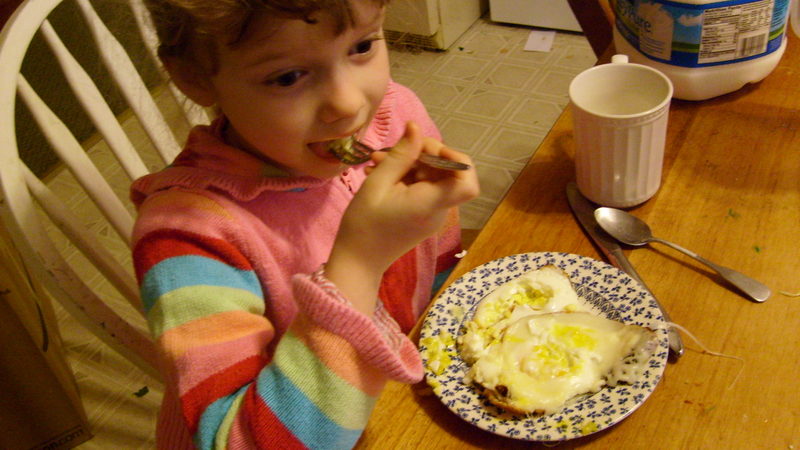 And sunny side up eggs (this pair with mozzarella) I mean she will now eat eggs like this, not that eggs fell out of her hat onto the library sidewalk.
And sunny side up eggs (this pair with mozzarella) I mean she will now eat eggs like this, not that eggs fell out of her hat onto the library sidewalk.
Yes I did make her clean up the sidewalk. I’m still not sure why she had clementine peels in her hat. They smell good?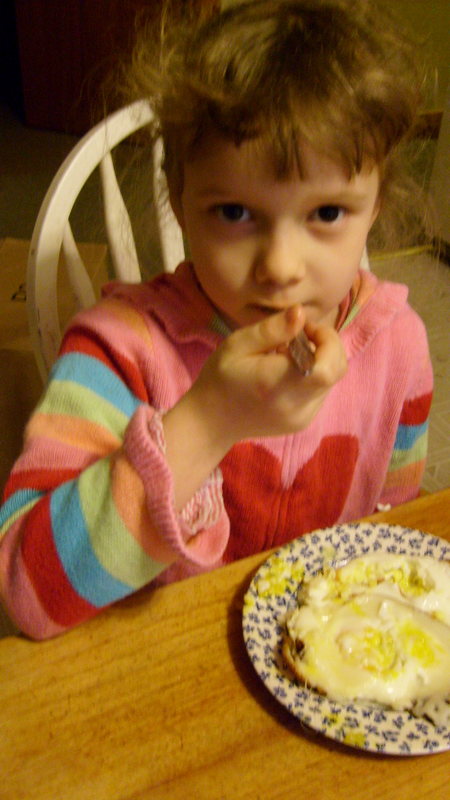
She asked Dan if he knew how to make those good eggs you dip toast in – the ones you put in the hot pan, then cover with a lid, then check if they are done, then slide onto a plate and give to your child?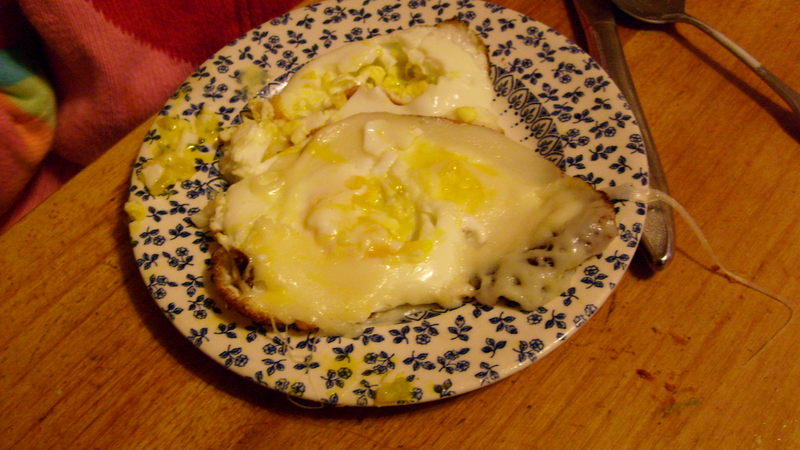
He didn’t, so I took pity on him and got up first. I made him coffee too.
Usually he rescues me first thing in the morning, so I was proud of this unusual morning.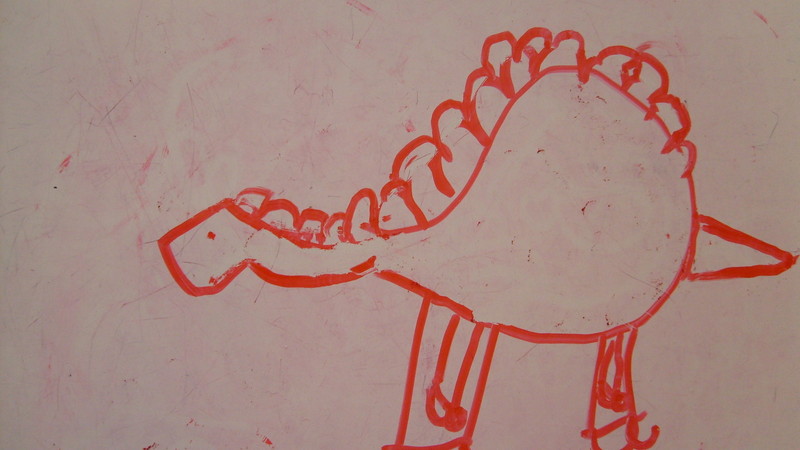
It was a pity to erase K’s apatasaurus so we could use the little white board for handwriting practice, so we took a photo first.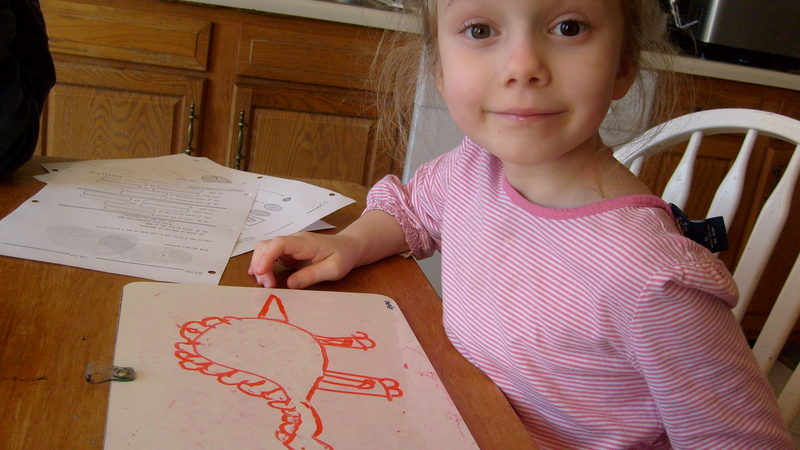
And then it was time to plug away at grammar. I am about to buy yet another grammar book. Some of my friends have large collections of algebra books that didn’t work for either parent or child, I have a grammar shelf.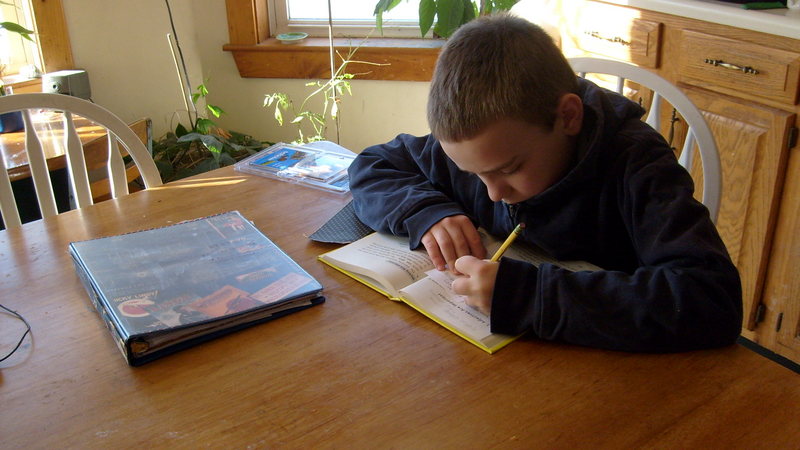 Give me algebra any day!
Give me algebra any day!


What kind of grammar books are you looking for? I may be able to recommend some.
Now this is an opportunity that does’t come up every day!
I’d like a grammar book that treats English verbs like an ESL book would, putting them into forms. M’s book identified which verbs needs a helping verb by if they ended in n or used a schwa. I guess that’s a good start, but I get so confused, the terms we use to talk about words seems to shift from book to book, and I remember they were the same words about words when I squeeked through French and Greek. (Not that I remember what those words were.)
I do want to diagram sentences, and I want a flow chart of questions to help us figure out which part of a sentence is which. A sense of humor would be nice too- it’s not as if English usage is obvious, too many conquests and invasions for English to be a simple, logical structure. It’s more like a corral reef, we may as well acknowledge that.
So far I’ve tried the one Charlotte Mason wrote, Rod and Staff publications, which are great, but put me to sleep in the older levels, Our Mother Tongue, and Ben is using “Enough about Grammar” which is really about how to write clearly, without knowing the ins and outs of why, for instance, the passive voice is evil.
Whichever books your most impatient, distracted, dysgraphic, annalytical students like is a good start for us.
I hear you about the inconsistencies in terms from book to book. I have had the same problem. I am not sure what you mean about forms and about verbs ending in n or schwa needing a helping verb. Do you mean when to pronounce the ed ending in the simple past tense as a “t” “d” or “èd” ?
One of the books that I like that compares two tenses side by side is Tense Situations. I use this with intermediate students who need to start learning some of the more subtle ways that we use tense to convey a meaning.
For the passive, is the problem not understanding when to use it or rather how to create it?
I had to use the passive voice in formal labs, diagramming sentences with it isn’t so hard, you just re-form it to active voice, then procede as usual. It reads OK in narratives as long as you aren’t trying to read them aloud. M isn’t really doing many compositions yet (reading literally kicked in this summer) Ben does have to do a lot of writing (and I should make him do more). He isn’t really tempted to use it much, more to put jokes everywhere without enough context for a reader to understand them.
The schwa was mentioned in M’s 60’s vintage 4th grade grammar as a way of knowing when a verb needed a helping verb too – like, “I have run to the store.” Not, “I runned to the store” which I can’t say he has ever wanted to say.
Looks like I can get Tense Situations used for under $20 – great! I’m looking into Analytical Grammar, but it’s new enough I’m going to have to buy it new – I do love getting used books, it’s less of a gamble if it bombs.
Well, that’s what the budget it for, and R & D is inherantly wasteful.